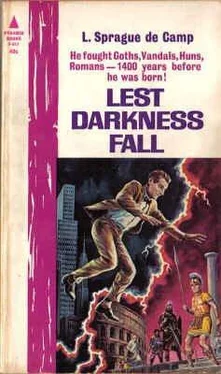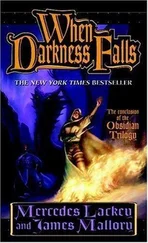L. Camp - Lest Darkness Fall
Здесь есть возможность читать онлайн «L. Camp - Lest Darkness Fall» весь текст электронной книги совершенно бесплатно (целиком полную версию без сокращений). В некоторых случаях можно слушать аудио, скачать через торрент в формате fb2 и присутствует краткое содержание. Год выпуска: 1941, Жанр: Альтернативная история, на английском языке. Описание произведения, (предисловие) а так же отзывы посетителей доступны на портале библиотеки ЛибКат.
- Название:Lest Darkness Fall
- Автор:
- Жанр:
- Год:1941
- ISBN:нет данных
- Рейтинг книги:4 / 5. Голосов: 1
-
Избранное:Добавить в избранное
- Отзывы:
-
Ваша оценка:
- 80
- 1
- 2
- 3
- 4
- 5
Lest Darkness Fall: краткое содержание, описание и аннотация
Предлагаем к чтению аннотацию, описание, краткое содержание или предисловие (зависит от того, что написал сам автор книги «Lest Darkness Fall»). Если вы не нашли необходимую информацию о книге — напишите в комментариях, мы постараемся отыскать её.
Lest Darkness Fall — читать онлайн бесплатно полную книгу (весь текст) целиком
Ниже представлен текст книги, разбитый по страницам. Система сохранения места последней прочитанной страницы, позволяет с удобством читать онлайн бесплатно книгу «Lest Darkness Fall», без необходимости каждый раз заново искать на чём Вы остановились. Поставьте закладку, и сможете в любой момент перейти на страницу, на которой закончили чтение.
Интервал:
Закладка:
As the happy couple departed, Padway ducked out of sight around a pillar. Mathaswentha, if she saw him out of the tail of her eye, may have thought that he was shedding a final tear. But actually he was allowing himself the luxury of a long-drawn 'Whew!" of relief.
Before he reappeared, he heard a couple of Goths talking on the other side of the pillar:
"He'd make a good king, eh, Albehrts?"
"Maybe. He would, by himself. But I fear he'll be under the influence of this Martinus person. Not that I have anything specifically against Mysterious Martin, you understand. But—you know how it is."
"Ja, ja. Oh, well, one can always flip a sesterce to decide which to vote for."
Padway had every intention of keeping Urias under his influence. It seemed possible. Urias disliked and was impatient with matters of civil administration. He was a competent soldier, and at the same time was receptive to Padway's ideas. Padway thought somberly that if anything happened to this king he'd hunt a long time before finding another as satisfactory.
Padway had the news of the impending election sent out over the telegraph, thereby saving the week that would normally be necessary for messengers to travel the length and breadth of Italy, and incidentally convincing some of the Goths of the value of his contraptions. Padway also sent out another message, ordering all the higher military commanders to remain at their posts. He sold Urias the idea by arguing military necessity. His real reason was a determination to keep Thiudegiskel in Calabria during the election. Knowing Urias, he didn't dare explain this plan to him, for fear Urias would have an attack of knightly honor and, as ranking general, countermand the order.
The Goths had never seen an election conducted on time-honored American principles. Padway showed them. The electors arrived in Florence to find the town covered with enormous banners and posters reading:
VOTE FOR URIAS, THE PEOPLE'S CHOICE!
Lower taxes! Bigger public works! Security for the aged! Efficient government!
And so forth. They also found a complete system of ward-heelers to take them in tow, show them the town—not that Florence was much to see in those days—and butter them up generally.
Three days before the election was due, Padway held a barbecue. He threw himself into debt for the fixings. Well, not exactly; he threw poor Urias into debt, being much too prudent to acquire any more liabilities in his own name than he could help.
While he kept modestly in the background, Urias made a speech. Padway later heard comments to the effect that nobody had known Urias could make such good speeches. He grinned to himself. He had written the speech and had spent all his evenings for a week teaching Urias to deliver it. Privately Padway thought that his candidate's delivery still stank. But if the electors didn't mind, there was no reason why he should.
Padway and Urias relaxed afterward over a bottle of brandy. Padway said that the election looked like a pushover, and then had to explain what a pushover was. Of the two opposing candidates, one had withdrawn, and the other, Harjis Austrowald's son, was an elderly man with only the remotest connection with the Amal family.
Then one of the ward-healers came in breathless. It seemed to Padway that people were always coming in to see him breathless.
The man barked: "Thiudegiskel's here!"
Padway wasted no time. He found where Thiudegiskel was staying, rounded up a few Gothic soldiers, and set out to arrest the young man. He found that Thiudegiskel had, with a gang of his own friends, taken over one of the better inns in town, pitching the previous guests and their belongings out in the street.
The gang were gorging themselves downstairs in plain sight. They hadn't yet changed their traveling clothes, and they looked tired but tough. Padway marched in. Thiudegiskel looked up. "Oh, it's you again. What do you want?"
Padway announced: "I have a warrant for your arrest on grounds of insubordination and deserting your post, signed by Ur—"
The high-pitched voice interrupted: "Ja, ja, I know all about that, my dear Sineigs. Maybe you thought I'd stay away from Florence while you ran off an election without me, eh? But I'm not like that, Martinus. Not one little bit. I'm here, I'm a candidate, and anything you try now I'll remember when I'm king. That's one thing about me; I've got an infernally long memory."
Padway turned to his soldiers: "Arrest him!"
There was a great scraping of chairs as the gang rose to its collective feet and felt for its collective sword hilts. Padway looked for his soldiers; they hadn't moved, "Well?" he snapped.
The oldest of them, a kind of sergeant, cleared his throat. "Well, sir, it's this way. Now we know you're our superior and all that. But things are kind of uncertain, with this election and all, and we don't know whom we'll be taking orders from in a couple of days. Suppose we arrest this young man, and then he gets elected king? That wouldn't be so good for us, now would it, sir?"
"Why—you—" raged Padway.
But the only effect was that the soldiers began to slide out the door. The young Gothic noble named Willimer was whispering to Thiudegiskel, sliding his sword a few inches out of the scabbard and back.
Thiudegiskel shook his head and said to Padway: "My friend here doesn't seem to like you, Martinus. He swears he'll pay you a visit as soon as the election is over. So it might be healthier if you left Italy for a little trip. In fact, it's all I can do to keep him from paying his visit right now."
The soldiers were mostly gone now. Padway realized that he'd better go too, if he didn't want these well-born thugs to make hamburger of him.
He mustered what dignity he could. "You know the law against duelling."
Thiudegiskel's invincibly good-natured arrogance wasn't even dented. "Sure, I know it. But remember. I'll be the one enforcing it. I'm just giving you fair warning, Martinus. That's one thing about—"
But Padway didn't wait to hear Thiudegiskel's next contribution to the inexhaustible subject of himself. He went, full of rage and humiliation. By the time he finished cursing his own stupidity and thought to round up his eastern troops—the few who weren't up north with Belisarius—and make a second attempt, it was too late. Thiudegiskel had collected a large crowd of partisans in and around the hotel, and it would take a battle to dislodge them. The ex-Imperialists seemed far from enthusiastic over the prospect, and Urias muttered something about its being only honorable to let the late king's son have a fair try for the crown.
The next day Thomasus the Syrian arrived. He came in wheezing. "How are you, Martinus? I didn't want to miss all the excitement, so I came up from Rome. Brought my family along."
That meant something, Padway knew, for Thomasus' family consisted not only of his wife and four children, but an aged uncle, a nephew, two nieces, and his black house slave Ajax and his wife and children.
He answered: "I'm fine, thanks. Or I shall be when I catch up on my sleep. How are you?"
"Fine, thanks. Business has been good for a change."
"And how is your friend God?" Padway asked with a straight face.
"He's fine too—why, you blasphemous young scoundrel! That will cost you an extra interest on your next loan. How's the election?"
Padway told him. "It won't be as easy as I thought. Thiudegiskel has developed a lot of support among the conservative Goths, who don't care for self-made men like Wittigis and Urias. The upper crust prefer an Amaling by birth—"
"Upper crust? Oh, I see! Ha, ha, ha! I hope God listens to you. It might put Him in a good humor the next time He considers sending a plague or a quake."
Читать дальшеИнтервал:
Закладка:
Похожие книги на «Lest Darkness Fall»
Представляем Вашему вниманию похожие книги на «Lest Darkness Fall» списком для выбора. Мы отобрали схожую по названию и смыслу литературу в надежде предоставить читателям больше вариантов отыскать новые, интересные, ещё непрочитанные произведения.
Обсуждение, отзывы о книге «Lest Darkness Fall» и просто собственные мнения читателей. Оставьте ваши комментарии, напишите, что Вы думаете о произведении, его смысле или главных героях. Укажите что конкретно понравилось, а что нет, и почему Вы так считаете.












